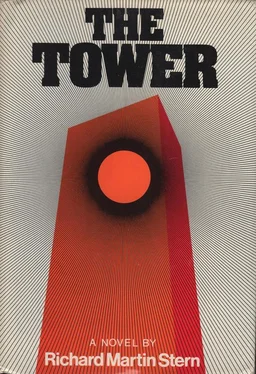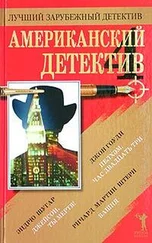Patty’s smile was gentle. “What is it you want, Nat?”
“I’m an architect. Maybe that’s it. What I want above everything else is space, room to move around in, distances you can see, mountains that make you feel small—”
“Room to breathe?”
Nat looked at the girl with new interest. “You do understand, don’t you?”
“Is that surprising?”
“I guess it is.”
“I’ve never been out in your country,” Patty said, “and I’d probably be out of place—”
Nat shook his head. “Not you.” He had said the same to Zib once, he remembered, but for wholly different reasons. “You’re—real,” he said now. “That’s a funny thing to say, I know.”
“I’m flattered.
“Bert,” Nat said. “You’re like him in some ways, a lot of ways. When Bert said something, you didn’t have to look it all over for booby traps. He said what he meant and he meant what he said.”
“I’m more than flattered,” Patty said.
From the far end of the trailer Brown said, “They’re on the roof.” A walkie-talkie was speaking hollowly. “Oliver wants the word when they’re ready in the Tower Room.” Brown held out the phone to Nat. “You’d better take over.”
Nat nodded. “Here we go.”
5:31–5:43
Paul Simmons drove back into Manhattan and parked his car in the basement of his office building. He started for the elevators and then changed his mind and walked out to the street and around the corner to a bar. It was dimly lighted and, except for the bartender, deserted. On the color television set behind the bar the World Tower writhed in smoke. Paul tried not to look at the screen as he paid for his drink and carried it to a corner booth. Thank God the bartender was not a talker.
So the cops had picked up Pat Harris. That was the first thing, and its implications were unpleasant. If that kind of pressure was on, then Pat Harris would think first, last, and always of his own neck, that was sure. The story he would tell would not be the one they had agreed on down in the game room, but the one he had threatened Paul with: Harris had wondered about the change orders, even questioned them, but Paul Simmons, his boss and an engineer, had told him to mind his own business and do what he was told. So maybe Harris came out of it not very bright, but neither was he apparently culpable. God damn Harris.
Harry Whitaker, the inspector with his hand conveniently out—what about him? In panic? Probably, because that was Harry Whitaker, but it would be well to find out. Paul maneuvered out of the booth and went to the public telephone.
Harry’s wife answered and did not even ask who was calling. Her screech for her husband almost shattered Paul’s eardrum.
Harry came to the phone at the double and his voice snarled, “Close the goddam-door?” Then, into the phone, in a different tone, “Yes?”
“Simmons here.”
“Oh,” Harry said, “thank God! I’ve been trying to get you, but they said—”
“Now you have me,” Paul said. His voice was cold. “What do you want?”
There was a significant pause. “What do I want?” Harry said in a new, wondering voice. “What do you think I want, Mr. Simmons? I want to know what to do.”
“About what?”
The pause was longer this time. “I don’t understand, Mr. Simmons.”
“Neither do I,” Paul said. The pause, he thought, would be almost interminable this time while the stupid oaf tried to think. It was.
“Look, Mr. Simmons,” Harry said at last, “haven’t you seen on TV what’s happening? At the World Tower, I mean? There’s fires, and people trapped up in that Tower Room, and there’s no power! There’s no power in that whole big goddam building! No electricity at all!”
“So?”
Harry’s voice tried to sound amused. “You’ve got to be kidding, Mr. Simmons. I mean, you know, you and I know what must have happened. There isn’t any other way. A primary short that wasn’t grounded—I mean, what else could it be?”
“I don’t know what you’re talking about,” Paul said. Harry’s breathing turned audible, harsh. “Look, Mr. Simmons,” he said, and his voice lowered now, was carefully controlled, “you paid me. You know you did. You told me everything would be all right, and once everything was buttoned up, who would know we’d cut a few corners, who would ever know? You never told me anything like this could happen. I mean, there’s two dead guys already, and some of the firemen they’ve carried out don’t look too good, and what if they can’t get those people down out of the Tower Room, how about that?” The voice paused and then took on new urgency. “If they can’t get those people, Mr. Simmons, that’s—murder! What do we do? That’s all. tell me what we do!”
“I wouldn’t know,” Paul said.
“Look, you paid me!”
“I paid you nothing. I don’t know what you’ve dreamed up, but leave me out of it.”
“You paid me!” The voice was out of control now. “You paid me! How do you think I went to Florida on that goddam vacation?”
“I wondered about that,” Paul said. “It did seem a little odd on an inspector’s salary.”
The pause this time was the longest of all. Harry’s hoarse breathing was the only sound. Then, “So that’s the way it is, is it?” he said. His voice was almost resigned. “Okay, Mr. Simmons. My name’s on all the sign-offs. I’m the guy they’ll come looking for. And you know what I’ll tell them? Do you know, Mr. Simmons?”
“Tell them what you please.”
“I will! I goddam will!” It was a shout, almost a scream. “You’re fucking well right I will! I’ll tell them what you paid me, right down to the last penny! I’ll tell them you told me it was all right, not to worry, nothing could happen! I’ll tell them I believed you!”
“But,” Paul said, “nobody will believe what you say. Do you have any witnesses, and photostats of checks, anything at all to prove anything? That’s what they’ll ask.
They’ll ask something else, too: ‘Harry,’ they’ll say, ‘aren’t you making all this up just to try to save your own miserable neck?’ And what answer will you give them to that, Harry?” Paul hung up and walked back to his booth, squeezed in, and sat down heavily.
Nat Wilson, he thought, Giddings, Zib, Pat Harris, and now Harry Whitaker; yes, and Patty herself, hadn’t she gone over to the other side? So where did that leave him? Just how vulnerable was he? Think, goddammit. THINK!
He had told Bert McGraw that he had followed the change orders without question because they bore Nat Wilson’s signature, which meant that Ben Caldwell’s authority was behind them. So?
It was a good story, one to cling to. Let Harris and Whitaker say what they chose, nobody could prove anything. Or could they?
There were his files upstairs in his office, and if there was a real stink raised, as there probably would be, a special inquiry into what happened at the World Tower, there was little doubt that the files of Paul Simmons & Company would be subpoenaed. So?
Face it, Paul told himself, the files were entirely too revealing. Any competent cost accountant could with little trouble turn up the fact that up to a certain point in the progress of the World Tower job, Paul Simmons & Company had been floundering in financial quicksand; but that in a remarkably short time there had been a sudden turnaround and the ratio of costs to payments received had taken a sharp reversal. Simmons & Company had not only climbed out of the quicksand, they had marched to high comfortable ground where the living was easy.
And it would be no trick at all for Nat Wilson to tie the sudden change in fortunes to the issuance of the first of the change orders. Simple as that. Nat Wilson again.
Читать дальше










